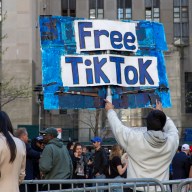 Tom Hanks tries to calm down Somali pirates in “Captain Phillips.”
Tom Hanks tries to calm down Somali pirates in “Captain Phillips.”
Credit: Hopper Stone
‘Captain Phillips’
Director: Paul Greengrass
Stars: Tom Hanks, Barkhad Abdi
Rating: PG-13
4 (out of 5) Globes
Thrillers based on true stories run into a conceptual snag: How can you milk suspense out of a story whose ending is already known? For the record, merchant mariner Richard Phillips, the subject of the new “Captain Phillips,” was not killed when he was kidnapped by Somali pirates in 2009. But this is a film by Paul Greengrass, the maker of the middle two, superior “Bourne” pictures. His cameras are always off the tripods; his editors are constantly moving to the next shot. He could work up an intense lather even when nothing much is happening.
And in “Captain Phillips,” there’s long stretches where nothing much is happening. The first half — following a dreadfully stilted opening with Phillips (Tom Hanks) at home with the wife (Catherine Keener) — gives him lots of meat to chew on. A cargo ship bound for Kenya draws the attention of impoverished Somali fishermen carrying automatic weapons. The cargo ship’s crewmembers are somewhat reluctant to fight pirates on their small salaries, but they manage to thwart the invaders — but not before the pirates capture Phillips, taking him with them onto a tiny lifeboat.
Even with quickly imbibed water and with the entire might of the Navy upon them, the pirates stretch this out for days. In a way it seems like a parody of a Greengrass film: His cameras shake and the music swells but the narrative is stuck in neutral for a good hour-plus-change. It’s all herky-jerked up with nowhere to go.
But there’s a sly intelligence to the film — a critique of how the most powerful nation in the world, with all of its forces, can be undone by a few dudes with guns. Greengrass is not a director of bold, iconic images — his movies move too fast — but one shot stands out: a tiny lifeboat surrounded by hulking aircraft carriers. It’s David and Goliath, with David the ostensible baddies. The pirates are types — the token hothead, the token nice kid in over his head — but they aren’t faceless. They’re introduced as impoverished, desperate men, but not as stock victims: Their furtively smart leader, Muse (Barkhad Abdi), knows how to play off cliches, repeatedly joking that they’re not Al Qaeda.
The script (by Billy Ray, of “Shattered Glass”) doesn’t go too far in humanizing the “villains,” or in demonizing the Navy, though they have to resort to duplicity to get the job done. But it carries a theme running through Greengrass’s films, from the “Bourne” movies to “United 93”: American might may look impressive, but it’s often an illusion, masking bureaucratic incompetence or worse.
















